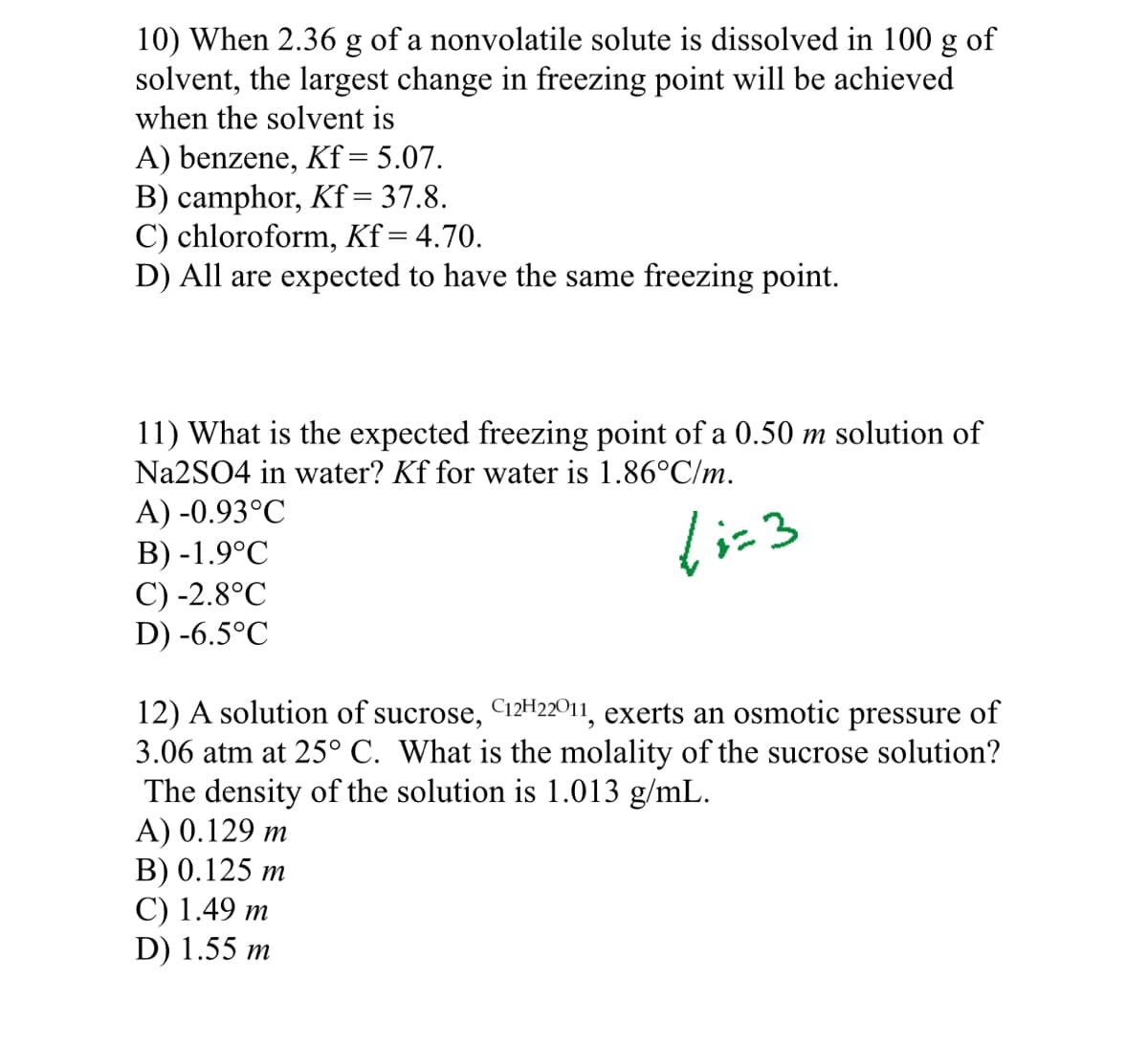10) When 2.36 g of a nonvolatile solute is dissolved in 100 g of solvent, the largest change in freezing point will be achieved when the solvent is A) benzene, Kf=5.07. B) camphor, Kf= 37.8. C) chloroform, Kf= 4.70. D) All are expected to have the same freezing point. 11) What is the expected freezing point of a 0.50 m solution of Na2SO4 in water? Kf for water is 1.86°C/m. A) -0.93°C B) -1.9°C С) -2.8°C D) -6.5°C liz3 12) A solution of sucrose, C12H22011, exerts an osmotic pressure of 3.06 atm at 25° C. What is the molality of the sucrose solution? The density of the solution is 1.013 g/mL. A) 0.129 m B) 0.125 m C) 1.49 m D) 1.55 m
10) When 2.36 g of a nonvolatile solute is dissolved in 100 g of solvent, the largest change in freezing point will be achieved when the solvent is A) benzene, Kf=5.07. B) camphor, Kf= 37.8. C) chloroform, Kf= 4.70. D) All are expected to have the same freezing point. 11) What is the expected freezing point of a 0.50 m solution of Na2SO4 in water? Kf for water is 1.86°C/m. A) -0.93°C B) -1.9°C С) -2.8°C D) -6.5°C liz3 12) A solution of sucrose, C12H22011, exerts an osmotic pressure of 3.06 atm at 25° C. What is the molality of the sucrose solution? The density of the solution is 1.013 g/mL. A) 0.129 m B) 0.125 m C) 1.49 m D) 1.55 m
Chemistry: Principles and Practice
3rd Edition
ISBN:9780534420123
Author:Daniel L. Reger, Scott R. Goode, David W. Ball, Edward Mercer
Publisher:Daniel L. Reger, Scott R. Goode, David W. Ball, Edward Mercer
Chapter12: Solutions
Section: Chapter Questions
Problem 12.95QE
Related questions
Question

Transcribed Image Text:10) When 2.36 g of a nonvolatile solute is dissolved in 100 g of
solvent, the largest change in freezing point will be achieved
when the solvent is
A) benzene, Kf= 5.07.
B) camphor, Kf= 37.8.
C) chloroform, Kf= 4.70.
D) All are expected to have the same freezing point.
11) What is the expected freezing point of a 0.50 m solution of
Na2SO4 in water? Kf for water is 1.86°C/m.
A) -0.93°C
B) -1.9°C
C) -2.8°C
D) -6.5°C
12) A solution of sucrose, C1222011, exerts an osmotic pressure of
3.06 atm at 25° C. What is the molality of the sucrose solution?
The density of the solution is 1.013 g/mL.
A) 0.129 m
B) 0.125 m
C) 1.49 m
D) 1.55 m
Expert Solution
Step 1

Trending now
This is a popular solution!
Step by step
Solved in 4 steps with 4 images

Knowledge Booster
Learn more about
Need a deep-dive on the concept behind this application? Look no further. Learn more about this topic, chemistry and related others by exploring similar questions and additional content below.Recommended textbooks for you

Chemistry: Principles and Practice
Chemistry
ISBN:
9780534420123
Author:
Daniel L. Reger, Scott R. Goode, David W. Ball, Edward Mercer
Publisher:
Cengage Learning

Chemistry & Chemical Reactivity
Chemistry
ISBN:
9781133949640
Author:
John C. Kotz, Paul M. Treichel, John Townsend, David Treichel
Publisher:
Cengage Learning

Chemistry & Chemical Reactivity
Chemistry
ISBN:
9781337399074
Author:
John C. Kotz, Paul M. Treichel, John Townsend, David Treichel
Publisher:
Cengage Learning

Chemistry: Principles and Practice
Chemistry
ISBN:
9780534420123
Author:
Daniel L. Reger, Scott R. Goode, David W. Ball, Edward Mercer
Publisher:
Cengage Learning

Chemistry & Chemical Reactivity
Chemistry
ISBN:
9781133949640
Author:
John C. Kotz, Paul M. Treichel, John Townsend, David Treichel
Publisher:
Cengage Learning

Chemistry & Chemical Reactivity
Chemistry
ISBN:
9781337399074
Author:
John C. Kotz, Paul M. Treichel, John Townsend, David Treichel
Publisher:
Cengage Learning

Chemistry: Principles and Reactions
Chemistry
ISBN:
9781305079373
Author:
William L. Masterton, Cecile N. Hurley
Publisher:
Cengage Learning

Chemistry: An Atoms First Approach
Chemistry
ISBN:
9781305079243
Author:
Steven S. Zumdahl, Susan A. Zumdahl
Publisher:
Cengage Learning
